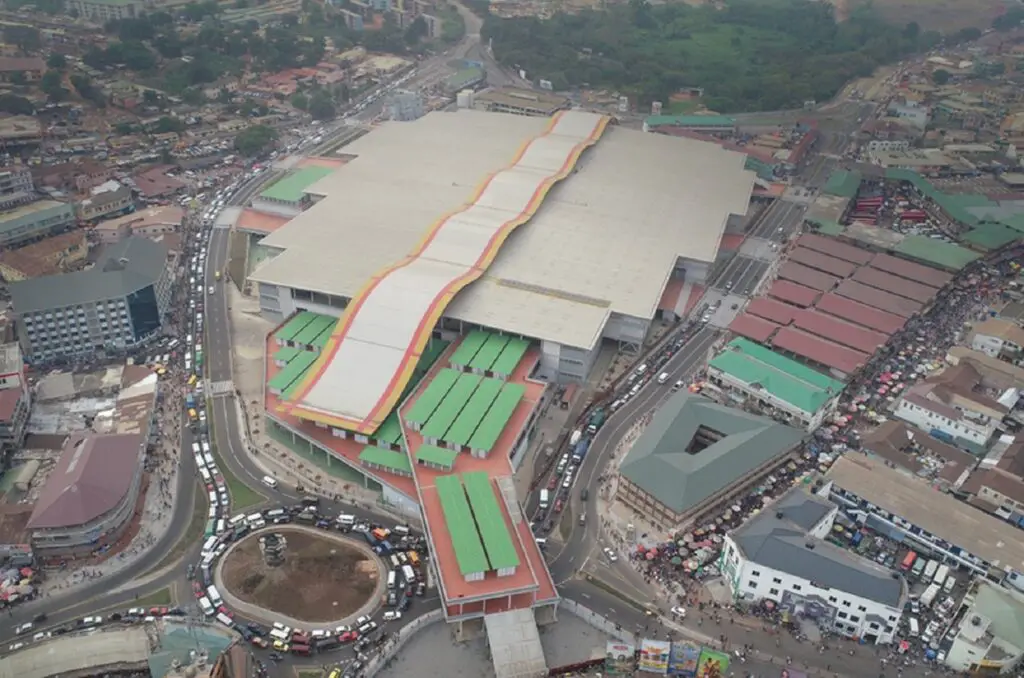- Kumasi is the largest market in West Africa.
- It neighbours Benin and Togo and has 800,000 people visit the market each day.
- Numerous fires in the area are because of its size and unplanned development.
West Africa’s largest market, the huge Kumasi Market in Ghana has more than 12,000 shops and stalls and with the traffic it receives, upgrades are inevitable.
Up to 800,000 people visit the market each day. The market neighbours Benin and Togo.
There have been numerous fires in the area because of its size and unplanned development, which has caused the destruction of many stalls and the loss of jobs.
Read: Ghana, Nigeria digital currencies sabotaging West Africa’s Franc
To avoid this, the Deutsche Bank together with the UK Export Finance Agency and the African Export-Import Bank have signed a financing agreement for the second phase of the Kumasi Market reconstruction project.
Financing for the project totals €184 million, including a UKEF-supported US$145 million loan and an Afreximbank commercial loan of US$39 million. Deutsche Bank is the lone structuring bank and designated lead arranger for these two loans.
The renovation project of the Ghanaian government for the market aims to improve environmental, health and safety and congestion issues in and around the market.
BHC of Scotland has been selected as the structural steelwork subcontractor by British civil engineering business Contracta Construction. BHC is receiving 8,000 metric tonnes of structural sections manufactured and supplied by British Steel as part of the development.
Deutsche Bank’s Alarik d’Ornhjelm, head of structured trade and export financing for the Middle East and Africa, said, “We are thrilled to be involved in the rebuilding of this renowned marketplace.”
According to GTR Review, a more developed market will stimulate economic activity and benefit the local community in other ways as well.
A number of small and medium-sized businesses in the broader supply chain benefit from the deal, which Deutsche Bank says contributes to its goal of enabling over €200 billion in sustainable finance and investments by 2023.
As of 2011, Deutsche Bank has organised financing of more than €3bn in Ghanaian infrastructure projects in over 20 deals.
Two loans totalling €203 million were closed by the bank in July 2021 for health and transportation infrastructure projects in Ghana.
The African Trade Insurance (ATI) agency covered 95 per cent of the loans granted to Ghana which was its first transaction in the West African nation.
Read: West Africa to fully adopt cleaner fuels and vehicles by 2025
Loans with ten-year terms are structured in accordance with the recently formed global loan market associations’ ethical lending guidelines and are also linked to the United Nations Sustainable Development Goals, according to Deutsche Bank.
Two additional highways will be upgraded with an additional €148 million in funding. The first is a route in Ghana’s southwest that connects Tarkwa and Nkwanta, passing near to the port of Takoradi. It’s a vital link between Ghana and its neighbouring countries, according to a July 7 statement from the bank.
There will be “economic benefits to residents in the surrounding districts, which mostly rely on agricultural output for their livelihoods,” Deutsche Bank said of a 40-kilometre section of road between Bechem and Akumadan.
Investment in infrastructure is essential for growth and a long-term asset for sustainable growth,” says Benjamin Mugisha, ATI’s chief underwriting officer.
Because of the Covid-19 pandemic, Africa is in desperate need of infrastructure development in order to spur economic growth and fill employment gaps.
Toward the end of June last year, the Ghanaian government announced a €280 million syndicated loan from Standard Chartered to upgrade a 64-kilometre stretch of road in the capital city of Accra.
Because it was organized around social loan principles, this was the bank’s first time doing so.
Read: West Africa’s successful cocoa coup heralds a new dawn
